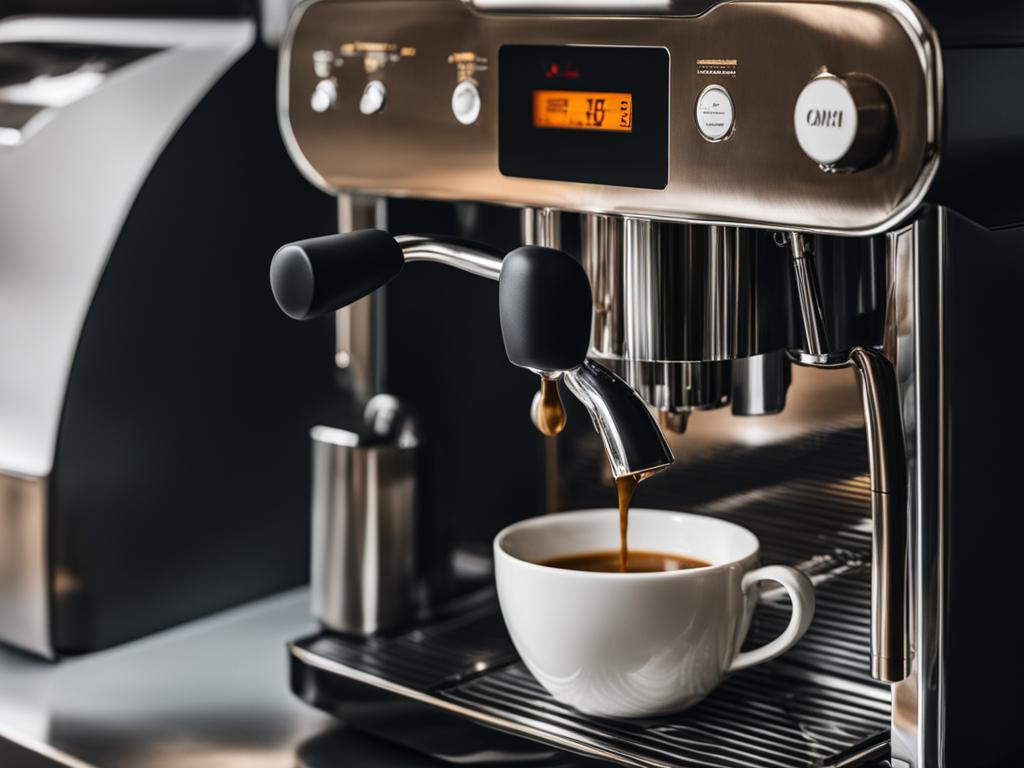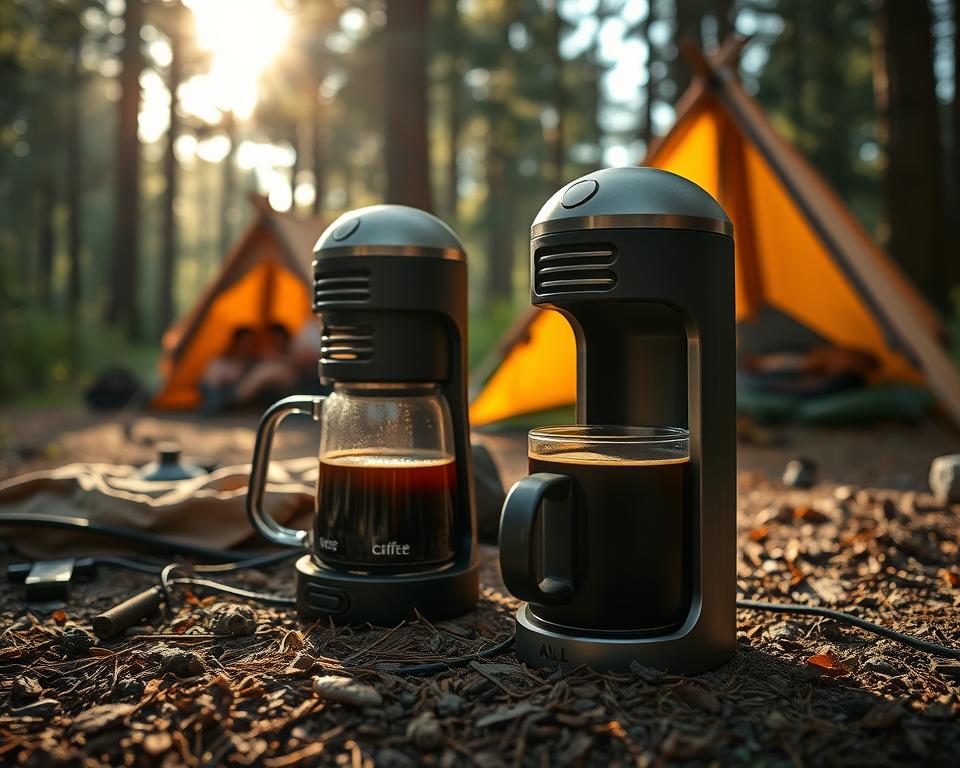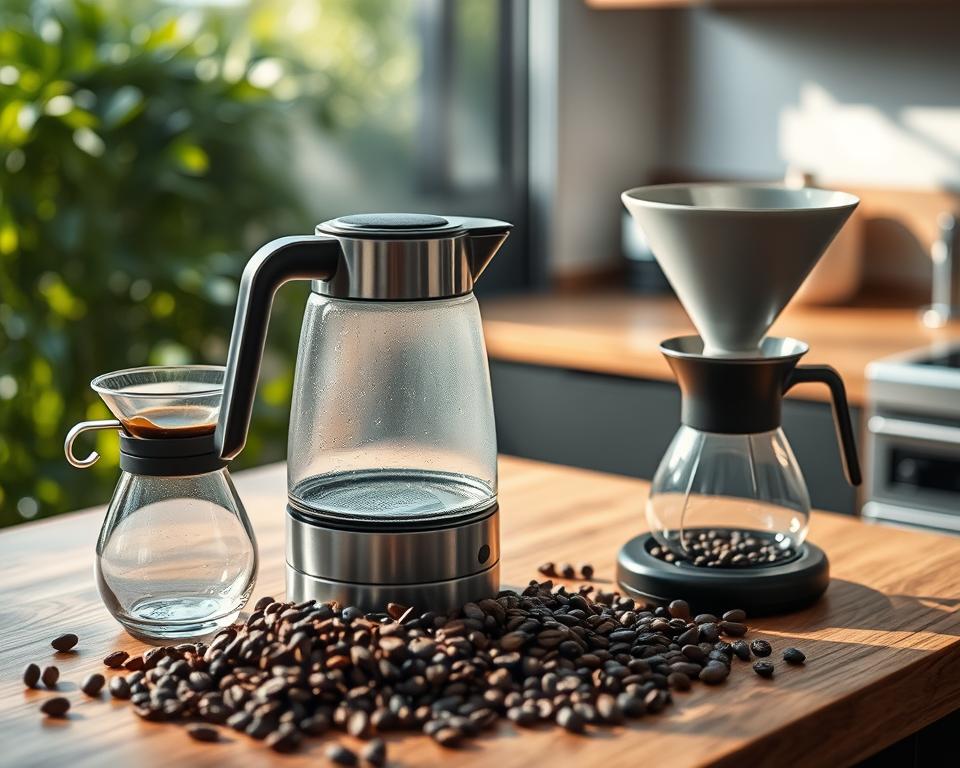A morning delight is waking up to the aroma of coffee brewing. The rich aroma, the warmth of the mug, and the first awakening sip are precious. However, there’s something many of us don’t think about: how to clean a coffee machine without vinegar.
Our trusted coffee machines, our morning pals, can harbour germs, yeast, and old. I realized this when I discovered the reservoir is one of the germiest places in our homes.
When I aimed to clean my coffee maker without using vinegar, my goal was simple. I wanted to keep the great taste of my coffee and make my machine last longer.
Lisa Yakas’s insights and the advice to deep clean monthly pushed me towards alternative cleaning methods. Avoiding utilizing vinegar ensures our coffee tastes great and gives us peace of mind.
We’re exploring how to keep our coffee tasting great without the smell of vinegar. With the right cleaning, every brew is a pure-taste celebration.
How to clean a coffee machine without vinegar? Key Takeaways
- Maintenance is key to ensuring the longevity and flavor of your coffee machine.
- Avoid the germ buildup in coffee makers by following a regular cleaning schedule.
- Explore vinegar-free solutions for coffee machine cleaning to spare your senses.
- Baking soda and lemon juice are effective, natural alternatives for descaling and cleaning.
- The right care can transform your daily coffee experience into one of safety, taste, and sophistication.
Introduction: The Importance of Regular Cleaning for Your Coffee Machine
Caring well for your coffee machine is key to a great cup of coffee. I always ensure my home-brewed coffee is top-notch, thanks to DIY coffee machine cleaning.
An unclean machine can hold harmful bacteria. The CDC warns that this can cause sickness, showing up as nausea or vomiting. So, knowing How to clean a coffee machine without vinegar is crucial for coffee lovers.
A shocking fact is that 85% of people don’t clean their water bottles enough. These can have more bacteria than things we see as dirty, like pet bowls or toilets. I apply this same idea to my coffee machine care.
It’s shocking how dirty it can get inside. The good news is that cleaning it—even coffee machine descaling without vinegar—is easy. Miele suggests cleaning the milk parts every week and descaling after every 200 drinks to keep it running well.
You don’t have to use vinegar to decalcify your machine. Lemon juice is also good, and it smells better. Wouldn’t you rather have your kitchen smell like fresh lemons instead of strong vinegar?
| Cleaning Necessity | Traditional Method | DIY Alternative | Frequency |
|---|---|---|---|
| Miele Milk Pipework | Proprietary Cleaner | Baking Soda Solution | Weekly |
| Miele Brew Unit Degreasing | Cleaning Tablets | Lemon Juice Soak | After 200 Drinks |
| Miele Descaling | Descaling Tablets | Descaling without Vinegar, such as using Citric Acid | Based on Water Hardness (Default Setting: 3) |
Choosing the right clean coffee maker without vinegar can improve your morning coffee. But what works best can vary from one coffee lover to another. Check the table for common cleaning tips, but your coffee machine’s manual is always the best guide.
Identifying When It’s Time for a Non-Vinegar Cleaning
Knowing when to switch from vinegar to natural coffee machine cleaning solutions matters a lot. It keeps your machine working well and ensures your coffee tastes great. Coffee oils can make up to 16 percent of the beans, needing regular cleaning, especially if you drink coffee daily.
Signs of Mineral and Grime Build-Up:
If my espresso machine brews slowly or my coffee maker is sluggish, it’s a clear sign. I can’t skip my weekly cleaning because of the hard water in my area.
Limescale build up is bad for both the taste and the machine’s health. Using eco-friendly coffee machine cleaning methods is important for keeping my coffee and conscience clean.
Detecting Bacteria and the Need for Maintenance:
A study by NSF International is eye-opening, showing that 50 percent of homes have coffee makers with yeast and mold. CBS News also found many bacteria types in coffee makers.
This information makes me deep clean my machine monthly. I use a mix of baking soda and water for a safe, deep clean. It keeps my machine and me healthy.
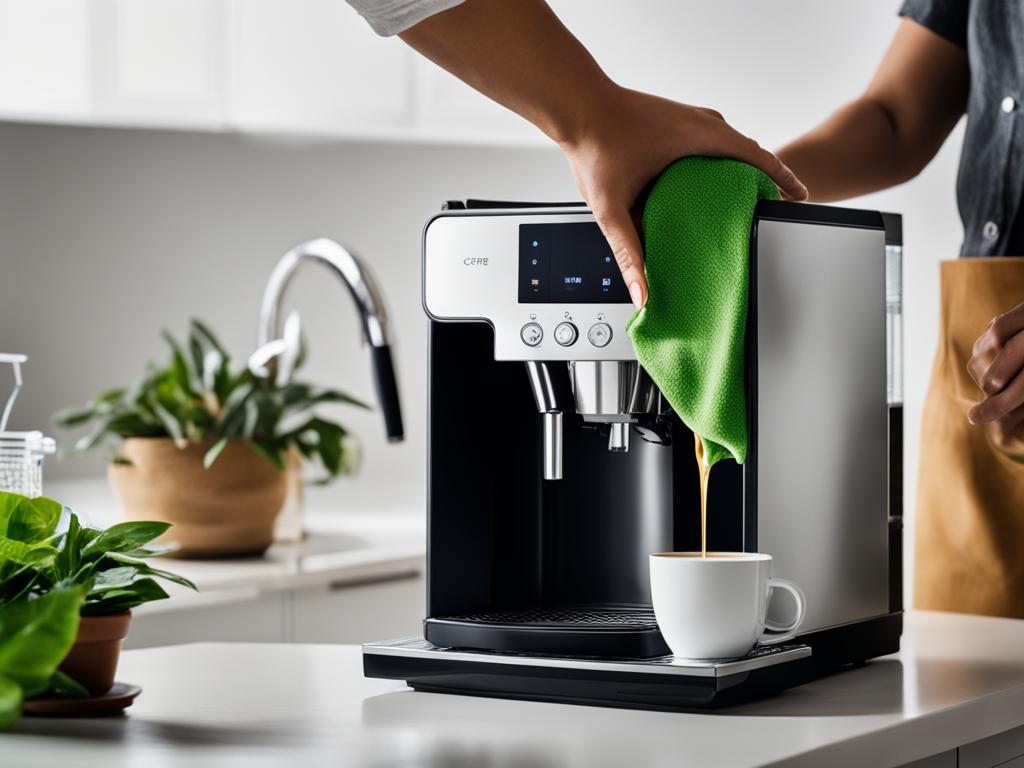
How to Clean a Coffee Machine Without Vinegar
If the smell of vinegar in your coffee machine turns you off, you’re in good company. Thankfully, you can still keep your coffee maker clean without it. Exploring alternative coffee machine cleaning methods was a game-changer for me. Especially knowing how germy coffee machine reservoirs can get.
Cleaning your coffee machine every week is key. Sure, descaling is something you do less often, but regular cleans are crucial. I’ll share some great tips for deep cleaning without vinegar.
These ideas come from coffee gurus and insights from Summer Rylander, a seasoned food and travel journalist.
You can clean with items like baking soda and lemon juice. Mixing warm water with ¼ cup of baking soda works wonders. Lemon juice is also great. It fights buildup and smells fresh.
Below is a table with some alternative coffee machine cleaning methods and when to use them:
| Cleaning Agent | Water Ratio | Frequency |
|---|---|---|
| Baking Soda | 1 cup warm water to ¼ cup baking soda | Monthly |
| Lemon Juice | 1 cup warm water to 1 cup lemon juice | Monthly |
| Cream of Tartar | 1 cup warm water to 3 tablespoons | Monthly |
| All-natural Dish Soap | Run warm water with a few drops of soap | Daily |
| Table Salt | Warm water with 2 tablespoons salt | As needed |
Don’t skip the daily cleans, like rinsing after each use. It keeps the machine spotless. For the best coffee taste, clean grinder parts often, based on your bean type. Following these non-vinegar coffee machine cleaning tips can keep both your machine and coffee tasting great.
Always rinse your coffee maker with water after cleaning. This removes the leftover cleaning mix and keeps your machine working longer. Plus, your coffee will taste better. So, when it’s time to clean, consider these alternatives. They’ll make your coffee taste fresher.
Eco-Friendly and Natural Alternatives for a Sparkling Coffee Machine
I am a home barista who cares deeply about espresso and our planet. Eco-friendly coffee machine cleaning has become a must in my kitchen. These natural methods are safe and keep my machine clean without harsh chemicals.
Lemon Juice: A Natural Descaling Solution
Lemon juice is my favourite for descaling. Its citric acid fights calcium buildup. When mixed with water, it leaves my machine fresh and clean, without the strong smell of vinegar.
Baking Soda: The Gentle Abrasive Cleaner
Baking soda is a soft yet strong cleaner. It’s perfect for gently removing coffee stains and oils. A paste of baking soda and water does the job without harming my machine.
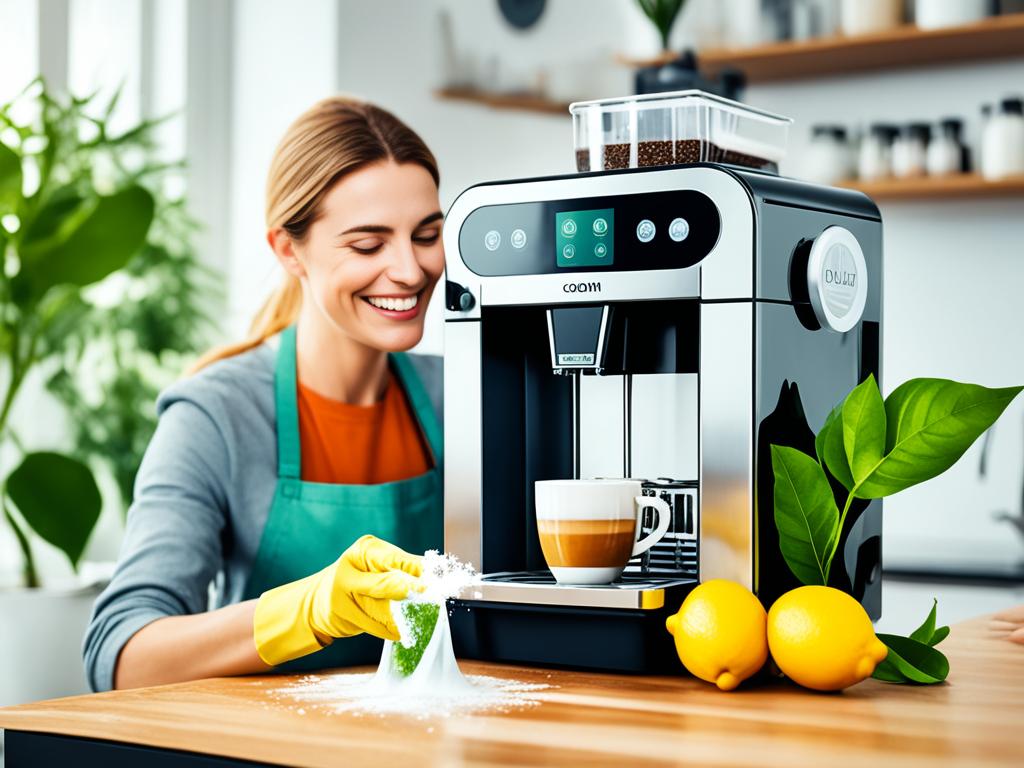
But there’s more to eco-friendly living than just cleaning well. Choosing the right products shows our dedication. I prefer brands like Brandless Tub & Tile Cleaner and AspenClean SuperScrub.
They are effective and consider the environment, with refill options and high EWG ratings. Essential oils add a natural scent to my home and coffee machine area.
Here’s a quick look at some of these products, their eco-credentials, and my personal experience with them:
| Product | Type | Eco-friendly Feature | Duration |
|---|---|---|---|
| AspenClean SuperScrub | Scrub | A Rating by EWG | Varies |
| Cloud Paper Reusable Dish Cloth | Dish Cloth | Washable, lasts up to 6 months | Up to 6 months |
| Grove Collaborative Coconut Scouring Pad | Scouring Pad | Non-Scratch, biodegradable | Varies |
| Brandless Tub & Tile Cleaner Refill Packs | Cleaner | Space-efficient, less waste | Varies |
Adopting these habits has changed my cleaning habits to help the environment. Spending a few hours a week on eco-friendly cleaning makes a big difference. It helps far beyond just my kitchen.
Maintaining Your Coffee Machine Between Deep Cleans
Keeping your coffee machine’s maintenance up isn’t just about descaling now and then. It’s about watching it closely and taking care of it often.
For instance, cleaning important parts daily can make your coffee taste better and your machine lasts longer. Taking a few minutes in the morning or after your last coffee can make a big difference.
But why are these quick cleanings so important? A study in 2011 found that the water reservoir is one of the germiest spots in a house, like some bathroom areas.
To avoid mold and germs, keep it dry and open when not in use. If you have a Keurig, it will tell you when to descale, usually after many brewing cycles. Descaling involves using a special solution to remove mineral buildup.
I don’t just wait for a reminder to clean my machine. I deep clean it every month, which is especially important for daily users to prevent mold.
If you don’t like using vinegar for descaling, try a denture cleanser in water for 30 minutes. Below is a table that shows the main maintenance tasks for great-tasting coffee:
| Maintenance Task | Details | |
|---|---|---|
| Descaling | Keurig: Every 3–6 months or as indicated | Standard: Monthly deep clean |
| Daily Cleaning | Wipe body, drip tray, K-Cup holder, funnel | <5 minutes |
| Preventing Clogs | Use a paper clip to clean needles | |
| Preventing Mold and Bacterial Growth | Keep the reservoir lid open | Rinse brew basket after use |
A little effort can prevent mold and germs in your coffee maker. Follow these simple coffee-making maintenance tips. You’ll enjoy every fresh and tasty sip you take!
Does the Oxygen Level in Water Impact the Need for Cleaning My Coffee Machine Without Vinegar?
The role of oxygen in coffee brewing is crucial, as it affects the extraction process and ultimately the flavor of your coffee. However, neglecting the oxygen levels in water may lead to mineral buildup in your coffee machine, increasing the need for cleaning without vinegar to ensure optimal performance.
How to clean a coffee machine without vinegar – Conclusion
Cleaning your coffee machine is key to great taste and health. Most of us clean our machines with white vinegar and water. But there are better-smelling, eco-friendly options. These options keep our coffee tasting good without harming the planet.
Did you know your coffee maker might have more germs than many places we touch every day? Using alternative ways to clean it can protect our health. A small step, like washing the brew basket, can keep our coffee and us in top shape.
Cleaning our coffeemakers does more than we think. It keeps the machine running well, and our coffee tastes perfect. By choosing greener cleaning habits, we make every cup of coffee better. This way, our next cup will be as delicious and healthy as we deserve.
FAQ
How to clean a coffee machine without vinegar?
Use lemon juice or baking soda to clean your coffee machine. Mix lemon juice with water for the brewing cycle. Or use a baking soda paste for the coffee pot.
What are the benefits of non-vinegar coffee machine cleaning?
Cleaning without vinegar is great for those who dislike vinegar’s smell. Lemon juice leaves a fresh scent. Baking soda effectively neutralises odours without harsh chemicals.
How do I use lemon juice to descale my coffee machine?
Mix equal parts water and lemon juice in the reservoir. Run a brewing cycle. Then rinse with a few cycles of plain water.
Can baking soda clean the coffee machine as effectively as vinegar?
Yes, baking soda is effective for cleaning. It works well on the carafe to remove stains. But it’s not used for descaling like lemon juice.
What is the importance of regular cleaning for my coffee machine?
Regular cleaning maintains your coffee machine’s taste, efficiency, and lifespan. It stops mineral and bacteria buildup, which can affect flavor and function.
What are some signs that my coffee machine needs cleaning?
Signs include taste changes, longer brew times, visible minerals, or odd smells. These indicate it’s time for a clean.
What eco-friendly cleaning methods are effective for coffee machines?
Citric acid powder in water is eco-friendly. Also, non-toxic, eco-friendly commercial descalers are good. They’re designed for coffee machines and are easy to use.
How often should I clean my coffee machine?
Deep clean every 3–6 months, or more often with heavy use or hard water. Clean removable parts daily.
What everyday maintenance tips can extend the time between deep cleanings of my coffee machine?
Rinse and dry all removable parts daily. Keep the water reservoir open to the air when not in use. This prevents mould and bacteria.
Are there any commercial non-vinegar cleaning solutions for coffee machines?
Many vinegar-free commercial cleaners exist. They’re made for coffee machines, offering a convenient alternative to DIY cleaning methods.

